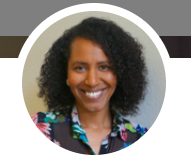This month’s professional spotlight features Afomeia Tesfai. Afomeia is the Policy and Advocacy Manager at the Center for Youth Wellness. Read this month’s spotlight to learn more about Afomeia and her work.
Could you briefly explain some of your responsibilities in your current career role?
My position as a Policy and Advocacy Manager provides diverse experiences and opportunities, ranging from policy analysis of a specific proposed bill, project managing a particular project and deepening understanding of political landscape to grow champions to become an advocate on childhood adversity. Another part of my role is supporting a coalition group of community advocates from various sectors who are working together on policies to prevent and reduce exposures to childhood adversity and toxic stress.
Recently, I began working on an environmental analysis to understand local and national public programs and legislative policies, to examine their outcomes and identify potential gaps. Our organization plans to use the analysis to shape our agenda as we consider our unique position within the field.
How did you come to decide that this was the right career path for you?
My parents (like most habesha parents) pushed the medical field at an early age. I went to college and majored in Community Health Education, with the intent of pursuing nursing afterwards. Then shortly after school, my father became ill and was hospitalized for two months. During those two months, I quickly recognized that I wouldn’t able to handle the emotional labor and the drawing of blood.
I knew the direct-patient work wasn’t for me, but I was still interested in continuing with the health field. Exposure to the hospital confirmed that I needed to pursue what worked for me and not follow the expectations of my parents.
Is there a philosophy that drives your career?
My work is guided by anti-racist principles, social justice and equity, centering those who are most burdened by an issue. Public Health is moving towards deliberate inclusion of race, recognizing that race is a determinant of health. Our ability to hold race and center people who are most impacted will help us find the solutions to the problems we see today. However, most of us want to exercise our power and knowledge, ignoring the lived experiences and expertise of those who are close to the issue.
I believe to transform our society and bring collective healing, we must see each other’s humanity and create power in poor, immigrant, and Black and Brown communities.
In your opinion, what are some public health issues impacting the Eritrean diaspora community? How can public health professionals address some of these challenges?
The public health issues in the Eritrean community are unique and vary between recent arrivals and individuals who have been here for a while. Recent arrivals struggle with access to housing, legal and social services, and medical and mental health services. Because many of the safety nets and social services that were available to our parents and families are no longer there, recent arrivals are relying more heavily on family and/or relatives to support them.
The Eritreans who have been in America for a while tend to experience and struggle with chronic conditions and diseases that are reflective of the experiences of Black and Brown people. We are noticing our parents and elders are more likely to have diabetes, high blood pressure, mental illnesses and cancer. Of course, many adults in our community are experiencing trauma and mental illnesses that are ignored.
Public health professionals who are working with Eritrean communities must understand the influence of our culture and traditions to begin addressing these issues. Interventions have to be culturally and linguistically relevant for our people.
What do you consider to be your greatest professional accomplishment?
In graduate school, I was one of the co-founders of the Committee on Oppression, Racism and Education (CORE). CORE was established to integrate anti-racist principles and frameworks into the Community-Oriented Public Health Program (COPHP) at the University of Washington. CORE today continues to address racism in the classroom environment and to ensure all students graduating from the program are prepared to address issues of racial equity as public health practitioners. By confronting the underlying drivers of health disparities that plague people of color, CORE has become a force for institutional change not just in COPHP but also in the School of Public Health, elsewhere in the University of Washington, and in the broader community.
What’s one piece of advice you would give someone looking to transition into your line of work?
Public health professionals are working at the intersection of health and economic instability, health and urban planning, education and health, criminal justice and health, etc. The determinants of health are much more than an individual accessing health care services, therefore many people’s current work essentially is tied to improving the conditions of communities and people. I would encourage someone to draw upon their current experiences and explore where your skills and expertise are needed. Of course, speak with people at different organizations who are doing the type of work you are interested in doing.
Outside of all of your hard work and efforts toward building your brand, what do you do for fun? Hobbies?
I enjoy exploring the Bay Area – it’s beautiful outdoors and nature, music scene and social events. It’s been amazing to connect with habesha people here and begin building with them on issues that impact our people.


Informative interview, Tnx Haftna….Proud of u!